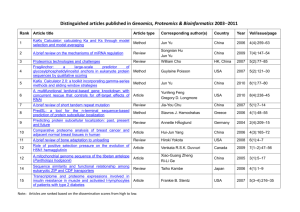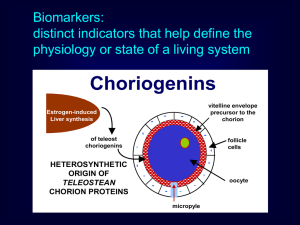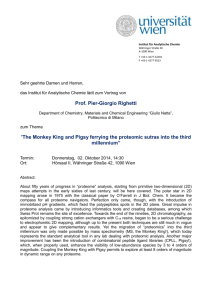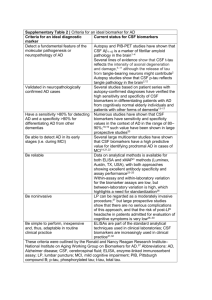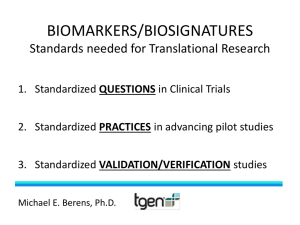Proteome Sciences is a global leader in applied proteomics and
advertisement
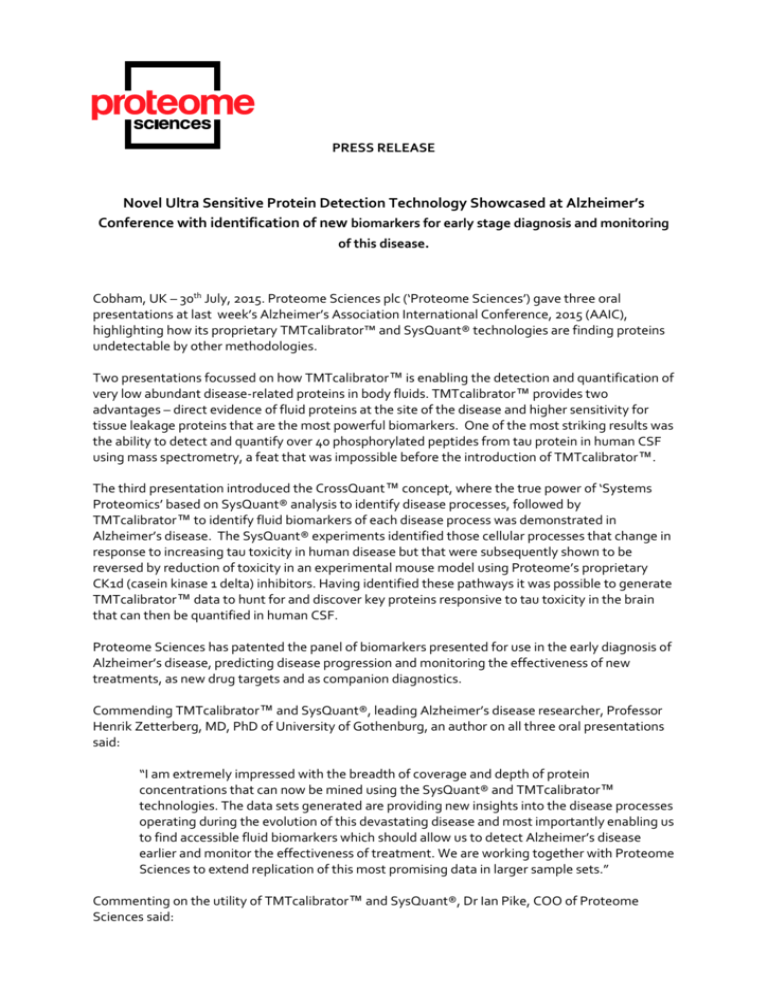
PRESS RELEASE Novel Ultra Sensitive Protein Detection Technology Showcased at Alzheimer’s Conference with identification of new biomarkers for early stage diagnosis and monitoring of this disease. Cobham, UK – 30th July, 2015. Proteome Sciences plc (‘Proteome Sciences’) gave three oral presentations at last week’s Alzheimer’s Association International Conference, 2015 (AAIC), highlighting how its proprietary TMTcalibrator™ and SysQuant® technologies are finding proteins undetectable by other methodologies. Two presentations focussed on how TMTcalibrator™ is enabling the detection and quantification of very low abundant disease-related proteins in body fluids. TMTcalibrator™ provides two advantages – direct evidence of fluid proteins at the site of the disease and higher sensitivity for tissue leakage proteins that are the most powerful biomarkers. One of the most striking results was the ability to detect and quantify over 40 phosphorylated peptides from tau protein in human CSF using mass spectrometry, a feat that was impossible before the introduction of TMTcalibrator™. The third presentation introduced the CrossQuant™ concept, where the true power of ‘Systems Proteomics’ based on SysQuant® analysis to identify disease processes, followed by TMTcalibrator™ to identify fluid biomarkers of each disease process was demonstrated in Alzheimer’s disease. The SysQuant® experiments identified those cellular processes that change in response to increasing tau toxicity in human disease but that were subsequently shown to be reversed by reduction of toxicity in an experimental mouse model using Proteome’s proprietary CK1d (casein kinase 1 delta) inhibitors. Having identified these pathways it was possible to generate TMTcalibrator™ data to hunt for and discover key proteins responsive to tau toxicity in the brain that can then be quantified in human CSF. Proteome Sciences has patented the panel of biomarkers presented for use in the early diagnosis of Alzheimer’s disease, predicting disease progression and monitoring the effectiveness of new treatments, as new drug targets and as companion diagnostics. Commending TMTcalibrator™ and SysQuant®, leading Alzheimer’s disease researcher, Professor Henrik Zetterberg, MD, PhD of University of Gothenburg, an author on all three oral presentations said: “I am extremely impressed with the breadth of coverage and depth of protein concentrations that can now be mined using the SysQuant® and TMTcalibrator™ technologies. The data sets generated are providing new insights into the disease processes operating during the evolution of this devastating disease and most importantly enabling us to find accessible fluid biomarkers which should allow us to detect Alzheimer’s disease earlier and monitor the effectiveness of treatment. We are working together with Proteome Sciences to extend replication of this most promising data in larger sample sets.” Commenting on the utility of TMTcalibrator™ and SysQuant®, Dr Ian Pike, COO of Proteome Sciences said: “The combination of SysQuant® and TMTcalibrator™ presented at AAIC is a unique protein detection platform that can be used from the earliest stages of diagnostic and drug development through to clinical trials to provide unmatched levels of sensitivity. “Our oral presentations at AAIC clearly demonstrate the ability of TMTcalibrator™ to identify very low abundant proteins in complex body fluids with minimum fractionation highlighting new biomarkers which could act as highly effective diagnostic and pharmacodynamic biomarkers. The power and data density of SysQuant® and TMTcalibrator™ is offering the opportunity to significantly reduce the cost and timescale profiles of drug and companion diagnostic development programmes. “Whilst these presentations were focused on Alzheimer’s disease, they also showed how far protein biomarker research has progressed in personalised medicine for all diseases and the crucial role played by Proteome Sciences to deliver these results”. ENDS For further information please contact: Proteome Sciences plc Christopher Pearce, Executive Chairman Dr. Ian Pike, Chief Operating Officer Geoff Ellis, Finance Director Public Relations IKON Associates Adrian Shaw Tel: +44 (0)1932 865065 Email: adrian@ikonassociates.com Tel: +44 (0)1483 271291 Mobile +44(0)7979 900733 NOTES FOR EDITORS : 1. The three oral presentations at AAIC 2015 were as follows: I. Discovery of multiple phosphorylated tau biomarkers in CSF using a novel mass spectrometry method – Using TMTcalibrator™ this data represents the most comprehensive profile of low abundant tau peptides and phosphopeptides in CSF to date. Measuring the phosphorylation status of CSF tau may provide new diagnostic, prognostic and surrogate biomarkers of drug response for AD. II. Microglial - derived proteins in CSF are candidate biomarkers for early diagnosis of Alzheimer's disease – Utilising the unparalleled sensitivity gains of TMTcallibrator™ to discover rare microglial derived proteins in CSF. These markers of neuroinflammation provide new biomarker candidates for very early stage diagnosis of AD. III. Discovering pharmacodynamic biomarkers for disease modifying therapies in Alzheimer's using different proteomics strategies with a common data analysis pipeline – SysQuant® and TMTcalibrator™ enable us to study the biggest challenges of clinical medicine. Using SysQuant® the key processes of AD pathology in human disease (tau-toxicity) and the reversal of this toxicity in a mouse model of AD using proprietary CK1d were studied. With a better understanding of these disease processes, we can then apply TMTcalibrator™ to hunt for changes in proteins from disease processes in peripheral fluids such as CSF. 2. How TMTcalibrator™ works: Hunting low-abundant biomarkers from disease tissue in plasma, CSF and other body fluids TMTcalibrator™ is a novel way of hunting for proteins released into body fluids by diseased tissue. These are the most relevant biomarkers but dilution means they are present at very low levels. Standard discovery proteomics in body fluids has relatively poor sensitivity and many tissue-derived proteins are not surveyed. Consequently, most biomarker panels comprise acute-phase reactant proteins, chemokines and cytokines that often lack specificity. TMTcalibrator™ overcomes these limitations by increasing the abundance of tissue proteins through TMT® isobaric tagging and spiking into body fluids, the key being that the total protein content from tissue is now substantially greater than that from the fluids. Once a biomarker panel has been identified, TMTcalibrator™ can be redesigned to provide a highly accurate absolute quantification assay with internal standard curves in the same MS/MS spectrum. 3. The benefits of TMTcalibrator™ : Enhanced detection of tissue biomarkers in body fluids Detection of low abundant biomarkers missed in standard MS workflow Four-point calibration curve for statistical assessment of ion interference Allows use of disease-related tissue or cells as surrogate biomarker donor to trigger MS and boost signal of equivalent marker in body fluid Can be combined with a wide range of proteomic workflows e.g. phosphopeptide enrichment to truly maximize signal enhancement Dramatically increases sensitivity of biomarker discovery in complex body fluids with minimal fractionation 4. How SysQuant® works: Next-generation pathway proteomics providing a helicopter view of active cell signaling and regulatory processes Personalized Medicine (sometimes referred to as Precision Medicine) could transform treatment outcomes but requires deeper understanding of disease biology, drug-target interaction and a system-wide view of mechanisms of action and resistance. Combining TMT® 10plex labeling with the fastest, most accurate mass spectrometers, SysQuant® provides the most comprehensive analysis of protein activity across regulatory and signaling pathways. Application of SysQuant (a global phosphoproteomic profiling workflow) to tissues and cells enables the identification of new targets and candidate biomarkers for early diagnosis, drug selection and monitoring of treatment outcomes. 5. The benefits of SysQuant®: Unbiased survey of cell signaling pathways regulated by phosphorylation Sample multiplexing using TMT® 10plex reagents High end mass spectrometry using the Orbitrap Fusion Tribrid ~1,000,000 quantitative data points per TMT® 10plex >8,000 unique protein groups and >12,000 unique phosphorylation sites Automated annotation of biological features from GO terms, KEGG, Phosphosite Plus, UniProt & Drugbank Outstanding bioinformatics and biological interpretation consultancy service 6. CK1d – out licencing opportunities Proteome Sciences has excellent toxicity results for two CK1d small molecule tau kinase inhibitors with in vivo data showing the modification of tau phosphorylation. Application of the SysQuant® proteomic workflow enabled a comprehensive assessment of the mechanism of action of these compounds and demonstration of modification of key pathways linked to amyloid processing. A statistically significant improvement in cognitive function in a mouse model of AD has also been demonstrated. The CK1d compounds are available for out licensing. 7. About Proteome Sciences Proteome Sciences is a global leader in applied proteomics and peptidomics offering high sensitivity, proprietary technologies for protein and peptide biomarker discovery, validation and assay development. The Company is headquartered in Cobham, UK, with laboratory facilities in London and Frankfurt. Proteome Sciences’ proprietary research has discovered a large number of novel protein biomarkers in key human diseases and is focused mainly in neurological/neurodegenerative conditions and in cancer. It has discovered and patented blood biomarkers in Alzheimer’s disease, stroke, brain damage and lung cancer for diagnostic and treatment applications that are available for license or have already been outlicensed. Hunting for novel protein biomarkers is very challenging and requires dedicated expertise. Proteome Sciences’ brings over 20 years experience to the problem and our proprietary workflows including TMT®MS3,SysQuant® and TMTcalibrator™ provide a strong advantage. The Company’s PS Biomarker Services™ division provides outsourced proteomics services and proprietary biomarker assays to pharmaceutical, biotechnology and diagnostics companies from its ISO 9001: 2008 facility in Frankfurt, Germany. -----------------------------------------------------------
